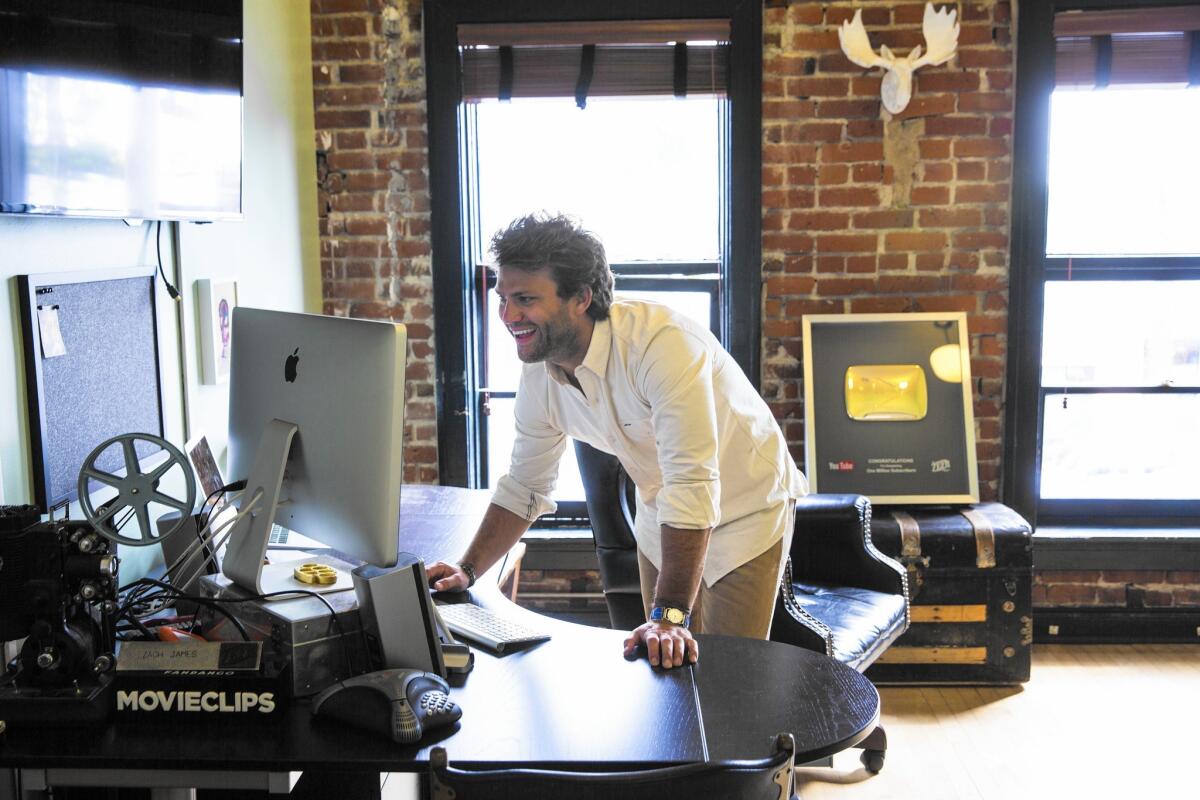Start-ups ramp up the fun in fierce contest to retain talent

The engineers at Venice start-up Zefr needed to unwind after completing a months-long project.
That’s when they entered the “War Room,” a specially built space inside the company’s offices with computers lined up against the walls for one purpose: computer game tournaments.
For the rest of the day, teams of five with names like Shades of Greyscale and Sit the Flak Down heckled, cheered and battled one another playing a classic first-person shooter called “Unreal Tournament.” Winners got Nerf guns. Afterward, the nearly 300 employees were treated to Fatburger, snow cones and beer.
Sign up for our free weekly business news briefing newsletter>>
“It’s a work hard, play hard mentality here,” said Eric Goldman, 26, a product manager, who was recently awarded a life-size cardboard cutout of himself in recognition of his work at the company. “Google has laundry as a perk. But we have the War Room, and it helps break the mold of a workday.”
The fun and games long synonymous with the tech industry can appear frivolous on the surface. But company founders and executives say the keggers, free trips to Comic-Con and pingpong competitions help galvanize a winning culture at companies where the pressure to grow rarely wanes. And it’s especially important today because of the intense competition for software engineers and other tech workers.
“We believe that culture is as effective as any marketing you can do in order to attract and retain the best talent,” said Zach James, Zefr’s co-founder and co-chief executive.
Moreover, experts say generous vacation policies, free lunches and awards for top employees tend to pay bigger dividends at early-stage tech companies where the smallest change in strategy can make a far bigger difference because of their exponential growth.
“These companies do in two years what most do in 10,” said Didier Elzinga, co-founder and CEO of Culture Amp, a human resources software start-up with offices in San Francisco and Melbourne, Australia. “When you talk about why culture matters, the reason is because you have so much to gain if you get it right.”
Keeping things fun, experts say, is meant to attract millennials, who make up a significant portion of start-ups’ staffs. The chosen activities are often a nod to a company’s earliest days when, say, an impromptu pingpong match lightened the mood during an especially tense round of funding. But it’s also meant to ensure a young company doesn’t work itself into the ground.
“If you’re too focused on productivity in an intensive environment like a start-up, you’re going to burn people out,” said Dave Seibold, vice chairman of the Technology Management Program at UC Santa Barbara. The perks “are a way of keeping the tension in balance, if you will.”
Corporate America has taken notice, hoping some of that magic rubs off. Start-up culture is now part of many traditional company playbooks — including open office spaces, the ability to work remotely, flexible hours and free yoga classes.
But tech companies are the most willing to experiment with their workplace atmospheres to get employees to perform, or at least think twice about jumping ship.
Zappos, the Las Vegas-based online shoe and clothing retailer, recently adopted a controversial system of management called Holacracy, which did away with job titles, managers and centralized power. (Innovative as it may prove to be, more than 200 employees left the company.)
Evernote, a Redwood City software company, offers unlimited paid vacation to employees. At Eventbrite, a San Francisco ticket booking software company, employees get treadmill desks and subsidized massages and acupuncture. And Warby Parker, an online eyeglass brand, has a staff group nicknamed the “fun committee” just to plan and organize employee events.
Of course, it’s not just about blowing off steam. Start-ups are also looking at ways to motivate their workers.
Each month at OpenX, an advertising software start-up in Pasadena, a pair of top-performing employees are awarded a new office chair. The tradition started in the company’s early days when it rented a run-down office space abandoned by a mortgage firm. Left behind were a dozen Herman Miller chairs, which were quickly distributed to deserving employees.
Perks at OpenX include catered lunch three times a week, happy hours and weekly visits from a chiropractor. But Tim Cadogan, the company’s chief executive, said the most effective tool was simply giving his employees greater responsibility, and by extension, a chance at contributing more to the company’s development.
“It’s all about making people feel valued and giving them a greater sense of purpose to do cool things,” Cadogan said.
“I don’t want to get into an arms race because we can’t offer more perks than Google,” he added. “What we can do is offer a bigger impact role than Google.”
At Zefr, in addition to the War Room, employees get yoga instruction twice a week, catered lunch each day and trips to Comic-Con.
The company, which helps movie studios monetize their content online and assists brands in expanding their reach on social media and YouTube, also has a soccer team and surf team and holds basketball and pingpong competitions.
Once a quarter, Zefr holds pep rally-like meetings known as “all-hands” to keep employees abreast of the latest projects and company events. Fog machines, lasers and vuvuzelas are part of the show. One software engineer, Steven Liu, stood up in front of his co-workers and sang Chamillionaire’s hip-hop hit “Ridin.’”
“Initially, it didn’t seem like a tech company,” said Liu, 25, who was caught off guard by the culture but has now been at Zefr for three years — or about five times longer than most engineers stay at a start-up, he reckoned.
James’ latest points of pride are a pair of eight-seat golf carts he calls the “party wagons,” which are outfitted with speakers and lights
for taking staff to Venice Beach and back from their offices on Abbot Kinney Boulevard.
“There’s significant cost to losing people,” James said. “That’s the way you think about it. You don’t think, ‘Oh my gosh, how much am I going to have to spend on this golf cart?’ You think, ‘How can I create a creative, zany, fun, wild, different environment for me to come to and then perform the best that I can perform?’”
david.pierson@latimes.com
Twitter: @dhpierson







